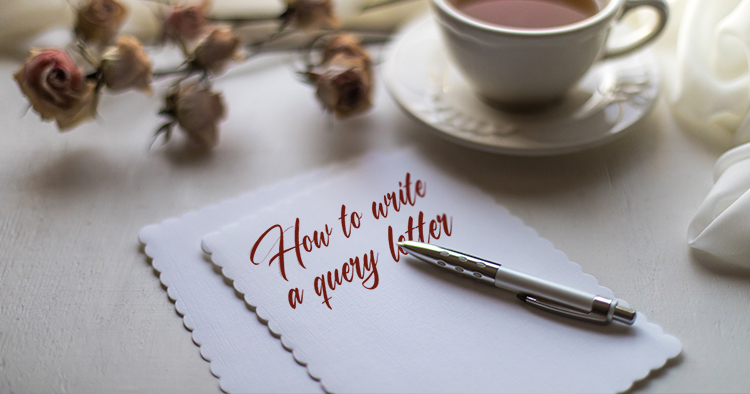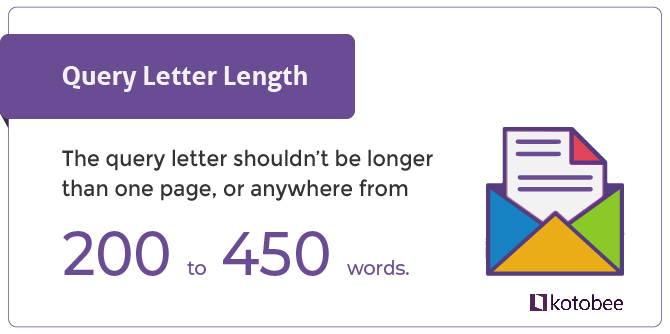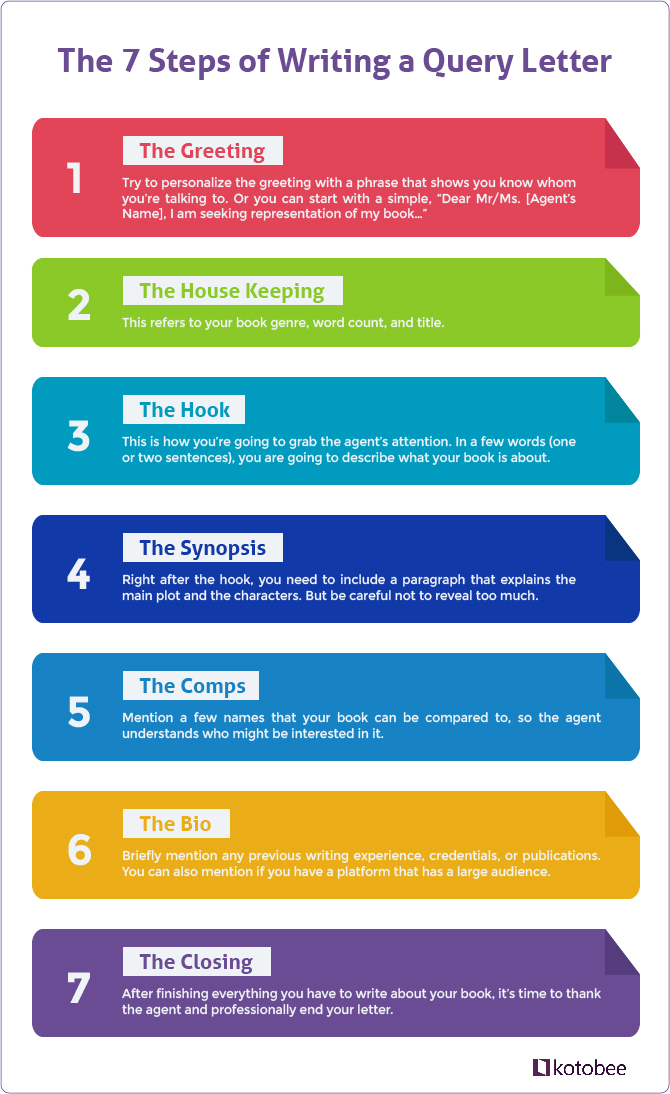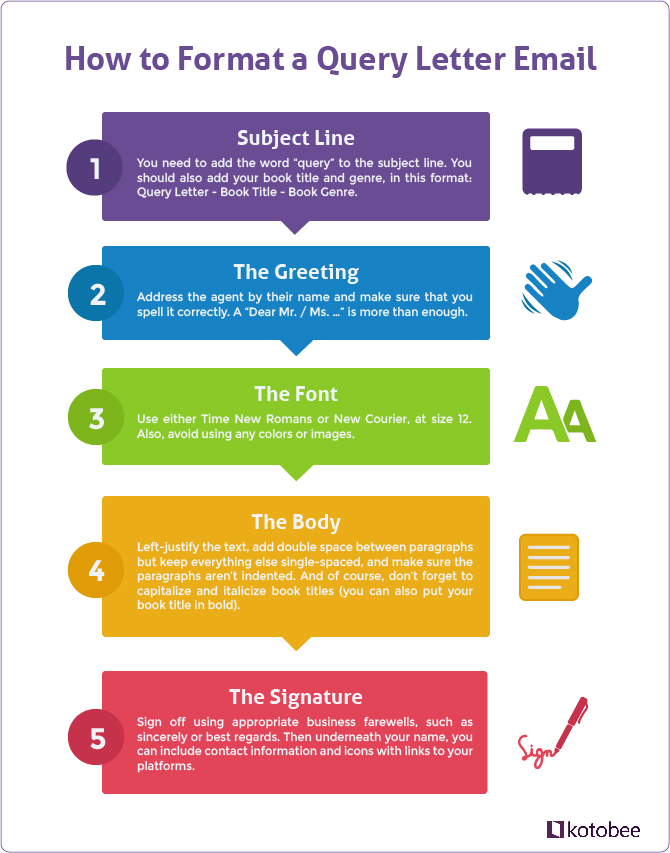Everything You Need to Know about Writing a Query Letter
Congratulations! You are done with the hard part–writing your manuscript–and now it’s time to publish your book. But before you go rushing into emailing agents, let’s first take a look at how to write a query letter that will get you a book deal.
While some people consider the process of writing a query letter daunting, you’ll find it pretty simple once you get the hang of it. And to make things easier for you, we are going to explore together what makes the perfect query letter that actually lands you an agent.

In this article, you’ll find:
- Query Letter Definition
- Query Letter Length
- When to Send a Query Letter
- Useful Tips before Writing a Query Letter
- What Is in a Query Letter
- How to Format a Query Letter Email
- Following Up on a Query Letter
- Official Query Letter Samples
What Is a Query Letter?
First things first, let’s understand what this query letter thing is all about.
Imagine the process of selling your book as a sales pitch. The query letter is the one-page letter you send to literary agents to make them want to know more about what you’re selling. It’s short, to the point, and must stand out for the agent to give it some consideration–they receive hundreds of queries every week!
How Long Should a Query Letter Be?
The query letter length can be tricky to maintain; it shouldn’t be longer than one page, or anywhere from 200 to 450 words. You have to be able to smartly summarize your 80K-word book in two or three paragraphs that will get the agent hooked.
That’s why you have to carefully consider everything you put in this letter. It might take some practice to get there, but learning how to craft your query letter is the first step in selling your book.

When Should You Send the Query Letters to Agents?
The logical answer to this question is: after you finish polishing your manuscript and it’s ready to sell. However, not every writer does this. Sometimes it is tempting to start sending query letters early on, as it might take a while before you hear back from the agent.
This isn’t the best solution though, because what if the agent did reply right away and requested a few chapters to read? Or what if it takes more time to finalize your book than you anticipated? This is going to leave you with one of two options: a) not giving your book the time it needs to be perfect, or b) telling the agent the truth, which won’t look so good.
So the perfect timing to send the query letter is after making it as perfect as it could be. Take a final look at the manuscript before you start writing that letter.
Tips Before You Start
You need to nail this in order to be taken seriously by agents. So before you start, here are some useful tips that are going to facilitate the writing process:
- Take a look at the best query letters out there. The internet is filled with successful query letter examples for different genres and kinds of books. And as the golden rule for writing goes: read, read and read! You don’t need to invent anything from scratch; instead, study other successful letters then make them your own.
- Take a look at what’s in the market. Several websites, such as Publishers Marketplace, post about the newest book deals. They offer a short description of every book. These sentences are well-crafted and will give you an idea of how to write a synopsis for your book.
- Read the guidelines. Usually, most literary agencies have submission guidelines. So before starting your query letter, make sure to read and follow them. This gives your letter a better chance to be considered.
- Hire an editor. If you have the budget for it, you can hire an editor that will improve your query letter. Having an expert help you with the letter is going to increase your chance of getting an agent. You can use websites that offer query letter reviews, such as Mary Kole or Reedsy.com, to help you do just that. There are also websites that offer a whole query package, such as QueryLetter.com.
How to Write a Query Letter?
So you sit down at your laptop, ready to email a few agents, then it hits you: what should a query letter contain exactly? We’re going to break it down to you: the greeting, the house keeping, the hook, the synopsis, the comps, the bio, and the closing.
The Greeting
A good start to your email would make the agent want to continue reading. So instead of sending the same email to tens of agents at once, starting it with “Dear Agent,” it’s better to personalize each email and start with their name.
Then immediately try to build rapport with the agent that will make you stand out from 100s of emails they receive each day. This part shouldn’t be longer than one or two sentences. You can use one of the following:
- If you’ve met them before, mention where.
- If someone referred you, mention who.
- If you heard them speak at a conference, mention when.
If none of the above applies to you, don’t panic! You can cut to the chase and just say you need representation for your book, then move on to the hook.
The House Keeping
This part is pretty simple and to the point. Here you mention information related to your book, such as:
- The category and/or genre: The category refers to the target reader’s age (i.e. young adults, early readers, etc.) and whether the book is fiction or nonfiction. The genre, on the other hand, refers to where the book would be put in a bookstore: the fantasy, sci-fi, thriller, romance, historical, or murder section. You can choose one category and one genre to describe your book, but if you aren’t sure where it fits, you can leave it out.
- Word count: Try to keep your book anywhere from 80,000 to 120,000. This of course varies depending on the book genre. But if the word count doesn’t abide by the guidelines, the agent might lose interest.
- Book title: the book title might change, and the agent knows that. So there is no need to explicitly say that’s subjective to modification. That said, having a strong title is a good way to show off your writing skills.
The Hook
We can definitely say that this is the most important part of a query letter. It can make or break the whole thing. Just as you start your book with a hook that keeps the readers going, you need to start your query letter in a way that makes your agent want to know more.
For the hook to be successful, try to think about the most important thing in your book that you want the agent to know about, whether it’s the character, time period, theme, or plot. Another thing to keep in mind is that your hook has to be open-ended; don’t burn the whole story in the very first line!
With that in mind, there are a few things you better avoid while writing the hook:
- Don’t start the letter with something like, “Hello, I’m Tom and my book is about…” This is, to be honest, very boring. Also, you’re going to talk about yourself in the bio section, so there’s no need to rush.
- Avoid using the first person when you write the hook. Even if your story is written from the first-person point of view, pretending to be the main character isn’t very professional. And the query letter is, after all, a business sales pitch.
- Something that is overused in query letters is starting with a question. More often than not, agents get tired from reading rhetorical questions. So be unique and add your own creative touch.
- Finally, your hook needs to be to the point. Write something too generic and you’re going to lose the agent’s interest.
The Synopsis
In this part, you need to find a good balance between the characters and the story problem. Just as you write a book blurb, the book synopsis has to be short and intriguing. It also has to leave the reader wanting to know more.
The hook and synopsis should be around 200 words. And to make it interesting, try to answer these questions:
- Who is the main character?
- What are the choices they have to make?
- What are the problems they are facing?
- What do they want? And what’s standing in the way?
- What is the setting or time period? (in the case of sci-fi or historical novels)
And remember, a good synopsis is the one that has the character in a tough place. It’s also the one that doesn’t have tons of information and doesn’t mention more than 3 characters. This will raise readers’ interest without spoiling the whole story.
The Comps
If the agent doesn’t understand where your book fits in the market, they won’t represent it. And that is what comps do. They also make the agent’s job of convincing publishers about your book easier. So make sure to include one or two titles that resemble your book.
Sometimes, finding good comps for your query letter won’t be the easiest task. That’s why you need to take your time and do good research before you settle on any titles. You might also consider:
- Not trying to find something exactly like yours. Instead, look for books that have the same style, plot, and character journey, and mention how they’re comparable to yours.
- Finding books that were published in the last 3 years. Mentioning books from 10 years ago isn’t a very good idea.
- Mentioning only comps that are a perfect fit. Not talking about any comps in the query letter is actually better than having something not related to your book.
- Mentioning a book that no one knows about won’t do you any favors.
- Asking librarians and other writers for help. People in the book community can guide you to many useful books.
- Making sure you’ve read the books you’re mentioning. Don’t just rely on titles you find on the internet.
- Using the formula, “My book is like the tradition of…,” or “Just like…, my book is about…”
The Bio
You’ve finished selling your book and now it’s time to sell yourself! Of course, not everyone is comfortable with this, but you need to give the agent a reason to believe they aren’t wasting their time by giving you a chance.
Here are something you can use in your bio:
- Your Career: If your work has helped you in writing your book, then you should definitely mention that. For example, if you’re a medical doctor writing about a girl waiting for a heart transplant but facing difficulties while in the hospital, then the agent will understand that you know what you’re talking about. You can say something like, “I was inspired to write this novel by my 10 years experience as a heart surgeon.”
- Special Research: Doing special research for your book gives it credibility and value. If your story is set in the Bahamas, for example, and you spent a few months there researching the island, then mention it here.
- Previously Published Work: Having a self-published book with strong sales is something you should mention. However, don’t try to sell a book you’ve already self-published; it won’t work. But if you’ve been published in some reputable journals, then you’ve to state it.
- Writing Credentials and Certificates: Mention any certificates you have in the field of writing. Also if you belong to a major writing organization or have attended any writing workshops that helped with your writing career, then put it in your query letter.
- Major Writing Awards: You should include any widely recognizable awards you’ve won. If it isn’t widely recognized but thousands of people participated, and you won, then maybe you can mention that.
- Platforms: Last but not least, you can mention any platforms of yours that have thousands of followers. This can be a blog, YouTube channel, a Facebook page, or any other social media platform with a large audience.
The Closing
The hard part is over. All that’s left now is to close your letter in a professional manner. Here are some tips to help you:
- Avoid over thanking the agent or writing, “I know you must be really busy and I am forever grateful for taking the time to read my letter.”
- Don’t introduce the idea of meeting the agent in person! Just say you’re looking forward to hearing from them.
- There is no need to editorialize; that is, you shouldn’t be commenting on how great your book is or telling the agent how much they are going to love your writing.
- You can mention here that any additional information is available at the agent’s request.

What Is the Proper Email Query Letter Format?
Most people no longer use snail mail to send their query letters. It’s surely easier and less time-consuming to send your letter via email. But before you hit “send” on that email, make sure you follow these guidelines:
- Subject Line: Since the agent probably receives other mails than query letters, you need to add the word “query” to the subject line. You should also add your book title and genre, in this format: Query Letter – Book Title – Book Genre.
- The Greeting: As we mentioned before, it’s better to address the agent by their name. Make sure that you spell it correctly and avoid using anything that seems casual, like: Hi There, Hello, or Hey Dude. A “Dear Mr. / Ms. …” is more than enough.
- The Font: This is one area in which you shouldn’t get any creative. Use either Time New Romans or New Courier, at size 12. Also, avoid using any colors or images.
- The Body: Your email can be divided into 4 or 5 paragraphs: first the greeting, second and third the housekeeping, hook, synopsis, and comps, fourth the bio, and fifth the closing. Also left-justify the text, add double space between paragraphs but keep everything else single-spaced, and make sure the paragraphs aren’t indented. And of course, don’t forget to capitalize and italicize book titles (you can also put your book title in bold).
- The Signature: Sign off using appropriate business farewells, such as sincerely or best regards. Then underneath your name, you can include contact information and icons with links to your platforms (especially Linkedin and/or Twitter).

Should You Follow Up on a Query Letter?
Most often than not, no reply from the agent means they are not interested. If you still want to follow up, then luckily for you, some agents state on their website their expected response time, which could be anywhere from 6 to 8 weeks, and it’s better to give them some more time after that. So You can follow up after 9 or 10 weeks after sending your letter.
Remember not to be vague about your follow-up mail. It’s a good idea to reply to the original email, and you can change the subject line to the following: Your name – Follow Up – Your Book Title. That way the agent will know what exactly you’re referring to.
Keep your follow-up email short and to the point. If there’s any new information that will help sell your book, add it here. Just avoid repeating yourself and make the agent’s time
Query Letter Examples
Now that we’ve covered everything about it, it’s time to look at sample query letters to literary agents from famous authors. The first one was shared by Nicholas Sparks on his website, for his famous book The Notebook.
Dear Mr. or Ms. Agent,
I would like to introduce you to my second book and first novel entitled, The Notebook.
My first book, Wokini, in which I collaborated with Billy Mills, was published by Orion Books, a division of Random House in 1994. An inspirational work, it was characterized by Al Neuharth, a founder and former chairman of USA TODAY, as a “powerful picture of the meaning of life,” while Peter Ueberroth called it “overwhelming and insightful.” A moderate commercial success, by May 1995, it had sold over 56,000 copies.
This novel, The Notebook, is a love story inspired by two special people that recently passed away after sixty years of marriage. They were no one you would know, but there was a grand romance between them, an underlying passion and understanding that had taken a lifetime to develop. In this day and age, the unconditional love they felt for one another makes for a wonderful story, one that is all too rare and much too beautiful to let die without being told.
Like Romeo and Juliet or The Bridges of Madison County, however, all great love stories need tragedy and separation, as well as love, to fully touch the reader, and their story was no exception. Alzheimer’s became part of their lives during their final years together and my most vivid memories are those of my grandfather sitting by a bedside and reading to his wife of sixty years, a woman who no longer remembered him. Seeing them this way nearly broke my heart, but never once did he bemoan his plight. “In my mind,” he used to tell me, “she’s the young woman I married long ago and nothing will ever change that.” This story is their story, a story of love, the most faithful love I’ve ever seen.
The Notebook is a tender novel set in the Deep South, a love story written in lyric prose. Like most Southern novels, The Notebook envelopes all that is special about the region and its people: tradition, loyalty, kindness, love and remembrance. Yet this novel stands alone in two important ways. First, it is one of the few passionate stories written about the elderly and it reveals a rare but dignified portrait of a couple struggling with the ultimate reality that their lives will be ending soon. Even more importantly, however, The Notebook is the first novel that describes the heart-wrenching effects of Alzheimer’s disease on two people who had loved each other all their lives. The result is a moving eulogy to old age itself—a story of love and grief that pretty much sums up the notable context of most people’s lives.
As a young writer in the South, I am looking for an agent-based in New York City. Your experience as a lawyer is very impressive, and it would be an honor to work with you on this novel.
I have included a brief synopsis and biography for your review. The novel is 52,000 words and fully complete. May I send you a copy of the completed manuscript?
Sincerely,
Nicholas Sparks
P.S. Because 22% of the people in this country (40+ million) are over 52 years old and 4.5 million people suffer from Alzheimer’s, this book is unique and marketable to a wide audience. In addition, at 52,000 words, it is short enough not to be cost-prohibitive to most publishing houses.
Another example of query letters that worked is one by the bestselling author, Jason M. Hough, for his book The Darwin Elevator.
Dear Ms. Megibow,
From your profile on Publisher’s Marketplace, I see that we share a love for John Scalzi’s Old Man’s War. I am contacting you for representation of my science fiction novel, THE DARWIN ELEVATOR. The manuscript is complete at 130,000 words, and can stand alone or become a series.
Skyler is immune to a disease that has wiped out most of humanity. Only one place on Earth is safe for those not immune: Darwin, Australia, where a space elevator of alien origin suppresses the disease. Trapped in the city, the ragged citizens of Darwin rely on food grown aboard orbiting space stations to survive. They rely on scavengers like Skyler for everything else.
With a small crew of fellow ‘immunes’, Skyler leads missions into the dangerous world beyond Darwin’s safe-zone, searching for the useful relics of old Earth. Spare parts, ammunition, books — for a price, Skyler will find it. When a reviled political leader hires him to retrieve information from a long-abandoned telescope, and smuggle the data to scientists living in orbit, Skyler is thrust into the middle of a conspiracy.
The telescope data proves another alien ship is approaching Earth. While trying to keep the discovery secret, Skyler’s employer sparks a bloody coup, led by a faction hell-bent on total control of the Darwin Elevator. As the uprising spirals into all-out war, and the alien ship nears Earth, Skyler must risk everything to protect a secret he barely understands.
I learned the art of creating fictional worlds while designing sci-fi video games, such as Aliens vs. Predator: Extinction and Metal Fatigue. These titles featured intricate stories and complex characters. I feel this experience, and my lifetime passion for the genre, has transferred well to the medium of the novel.
I would be happy to provide additional materials at your request. Thank you for your consideration.
Regards,
Jason M. Hough
Other Alternatives
We know that the querying process needs a lot of patience. And sometimes, one gets tired of the rejection and the waiting. Well, there are other alternatives that will help you reach a wider audience and sell your book without going through the hassle of sending query letters.
You can, for example, try digital publishing and selling your book on Amazon, or any other digital publishing platform. You can also use Kotobee to turn your manuscript into a stunning ebook.
Final Words
In the end, getting an agent hooked on your letter is a matter of practice and skill. Try drafting more than one query letter and getting other writers’ opinions. You can head to Twitter and ask the #writtingcommunity for advice, or you can simply hire an editor to review your letter.
.
Read More Here
15 Important Tips On How To Write A Hook












albert
October 27, 2023Fiction refers to literary works that are created from the imagination, rather than being based strictly on real events or facts. In fiction, authors invent characters, settings, and plotlines to tell a story.
Kotobee
November 6, 2023Hi Albert!
Thank you for your input regarding the definition of fiction. You are absolutely right; fiction encompasses literary works that originate from the imagination, allowing authors to craft characters, settings, and plotlines creatively.
If you would like to know more about the different elements of fiction, make sure to check this article on our blog: https://blog.kotobee.com/elements-of-fiction/